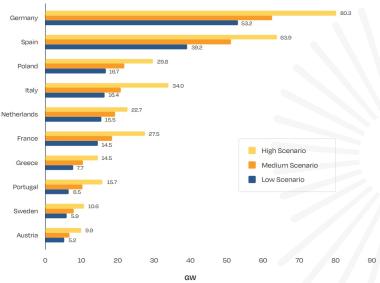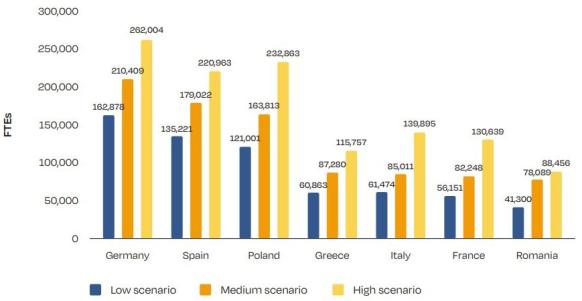Europe's solar builders face jobs battle on multiple fronts
As costs rise and installation rates grow, solar developers are seeking national and EU initiatives to tackle a worsening worker shortage.

Related Articles
Demand for solar workers in Europe is rising faster than expected as European Union countries increase solar targets to bolster energy security following Russia's invasion of Ukraine.
EU solar employment is forecast to rise by 24% this year to 804,702 jobs as rising deployment rates create installation jobs, industry association SolarPower Europe said in its latest annual jobs report.
The industry will require over a million solar workers by 2025 under a "medium scenario," far higher than previously forecast, SolarPower Europe said.
Skills shortages are already a major issue for developers. Companies must compete for skilled workers against other energy sectors and the automotive industry, particularly in engineering and electronics fields.
“Much more PV could have been installed” over the last two years without labour shortages, a spokesperson for SolarPower Europe said.
Rooftop solar is particularly active at the moment, accounting for 73% of EU solar installation jobs, but utility-scale deployment is set to climb and will represent 37% of roles by 2027, the industry group said.
Europe's largest economy Germany aims to triple solar capacity to 215 GW by 2030 and will overtake Poland and Spain as the largest solar job market by 2027, the report says.
Forecast largest EU solar markets in 2023-26
(Click image to enlarge)
Source: SolarPower Europe, December 2022
The largest countries in the region - Germany, France, Italy, Spain and the UK - all require large numbers of skilled renewable energy workers, Elisabeth Paasch-Colberg, Head of Global Talent Acquisition at developer BayWa r.e. told Reuters Events.
The shortage of skilled solar labour is “one of the most pressing challenges for project developers,” a spokesperson for German utility EnBW said.
Competition for workers is increasing costs and developers want EU countries to do more to improve the mobility of workers as countries deploy solar at different rates and confront internal labour dynamics.
Germany hires
Poland had 146,851 full-time equivalent (FTE) solar job roles in 2022, the highest in Europe due to a high percentage of labour-intensive rooftop solar activity. Spain had 103,337 FTEs and Germany 95,643 and these countries will spearhead growth in the coming years.
Germany will become the largest labour market as it pursues a target of 80% of power from renewable energy by 2030 through a rapid hike in rooftop deployment and faster deployment of utility-scale solar.
To achieve its goals, annual solar installations must rise from 7.4 GW in 2022 to 22 GW by the middle of the decade, including 11 GW of ground-mounted solar, Germany's energy and climate ministry BMWK said.
Forecast top EU solar employment countries in 2027
(Click image to enlarge)
Note: FTE = Full-time equivalent job.
Source: SolarPower Europe's 'EU Solar Jobs Report 2023' (October 2023)
A long-term decline in the number of people gaining qualifications in science, technology, engineering, and mathematics (STEM) is reducing the available talent pool for all, said Paasch-Colberg.
There is fierce competition for design engineers and also high demand for grid engineers, among other roles, she said.
In Germany, there is a pressing need for experienced project managers for utility-scale projects and candidates with experience in building permits are in high demand, a spokesperson for EnBW said.
The utility is optimising existing staff resources and leveraging economies of scale but "with the further acceleration needed in the energy transition, additional skilled workers are required for future projects," the spokesperson said.
Solar developers are increasingly incorporating battery systems, requiring workers to learn additional skills.
There is also high demand for staff to work in regulatory compliance and stakeholder coordination, as well as data analysis, Paasch-Colberg said.
IT and digital skills will be key for almost every solar job, particularly in project development and operations and maintenance (O&M), she said.
Joint effort
In a tough job market, BayWa r.e. is upskilling workers through in-house learning and job exchange programs but the "renewables industry will need to work closer together to bridge knowledge gaps and to attract talent,” Paasch-Colberg said.
The systemic trend away from technical science and engineering qualifications will take many years to address, she warned.
Utility-owned Enel Green Power has created specific retraining programs for workers from other utility and industrial sectors. Seven out of ten jobs in the oil and gas sector have overlapping skills with renewable energy, Giorgia Torrente, People Partner at Enel Green Power, told Reuters Events.
Like in many industries, potential candidates in Germany are demanding additional benefits, such as flexible working hours, the ability to work remotely and more paid leave, the EnBW spokesperson said.
Enel also works closely with universities in Italy and includes masters degree courses with some apprenticeship roles. The group is focusing on roles in mechanical, civil, electrical and control systems engineering, project management and environmental engineering, highlighting the STEM shortage.
Many developers are active in several European countries and national and EU hiring processes must be streamlined and facilitated across industries, governments and policies “to allow for easier cross-border hiring and posting," said Paasch-Colberg.
This should include "clear EU-wide regulations for individual and corporate taxes, social security issues, employment law and insurances” as well as more EU industry standards including cross-border acceptance of national certificates, she said.
EU-wide initiatives are also needed to train and upskill workers, Paasch-Colberg said.
Potential solutions include the creation of an EU degree for engineering and support for vocational training in manufacturing and energy sector roles, she said.
Reporting by Neil Ford
Editing by Robin Sayles


